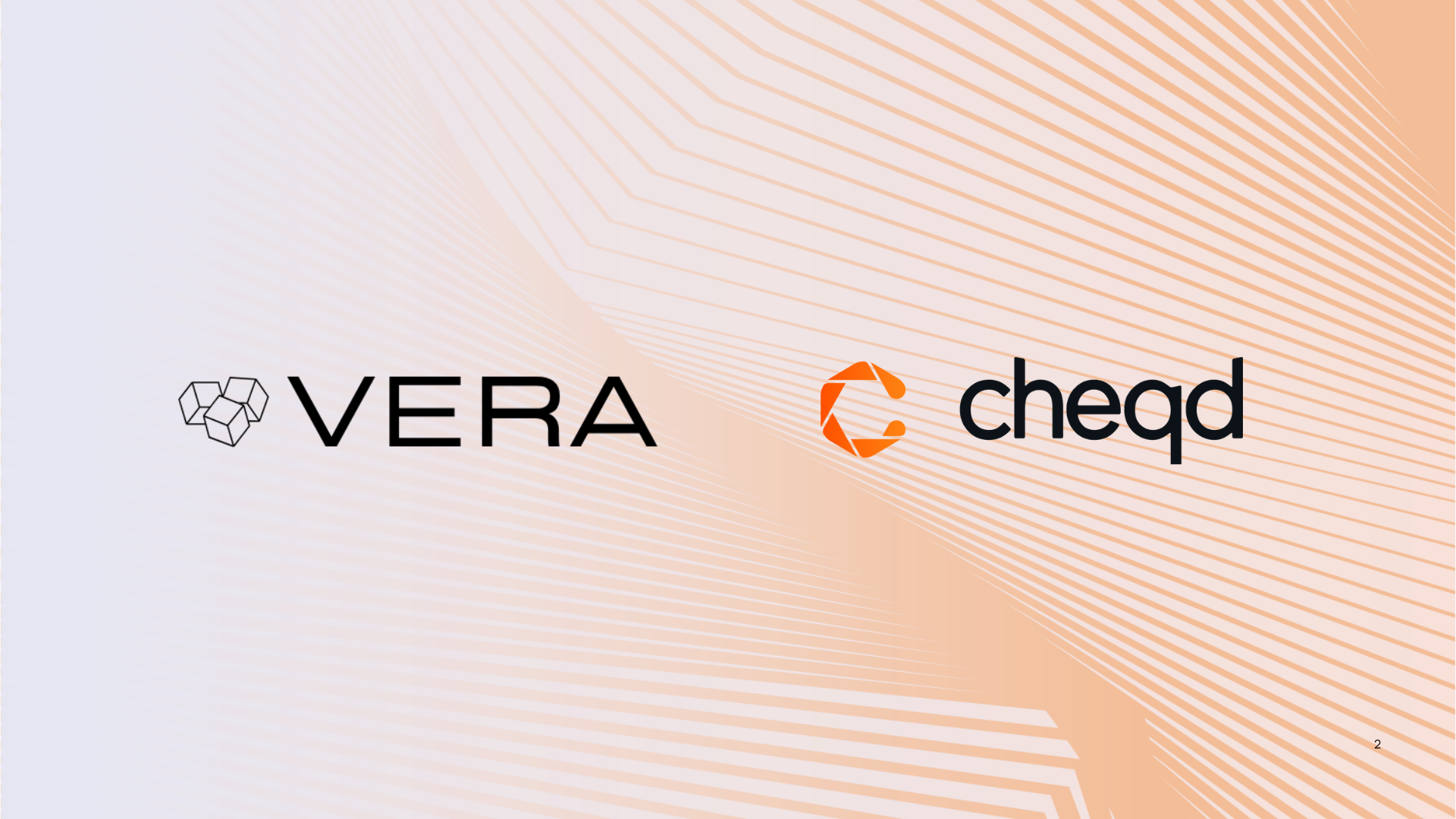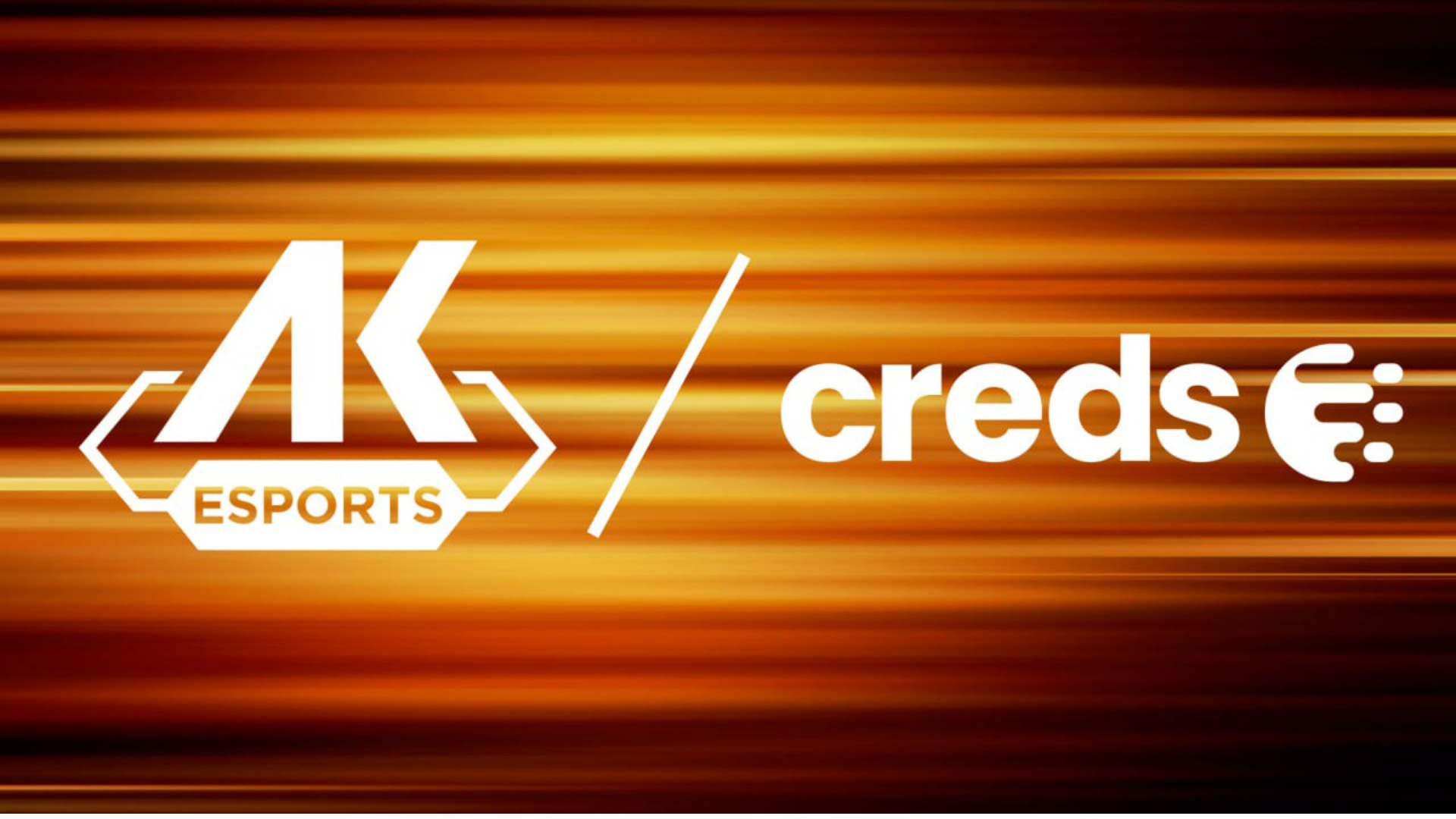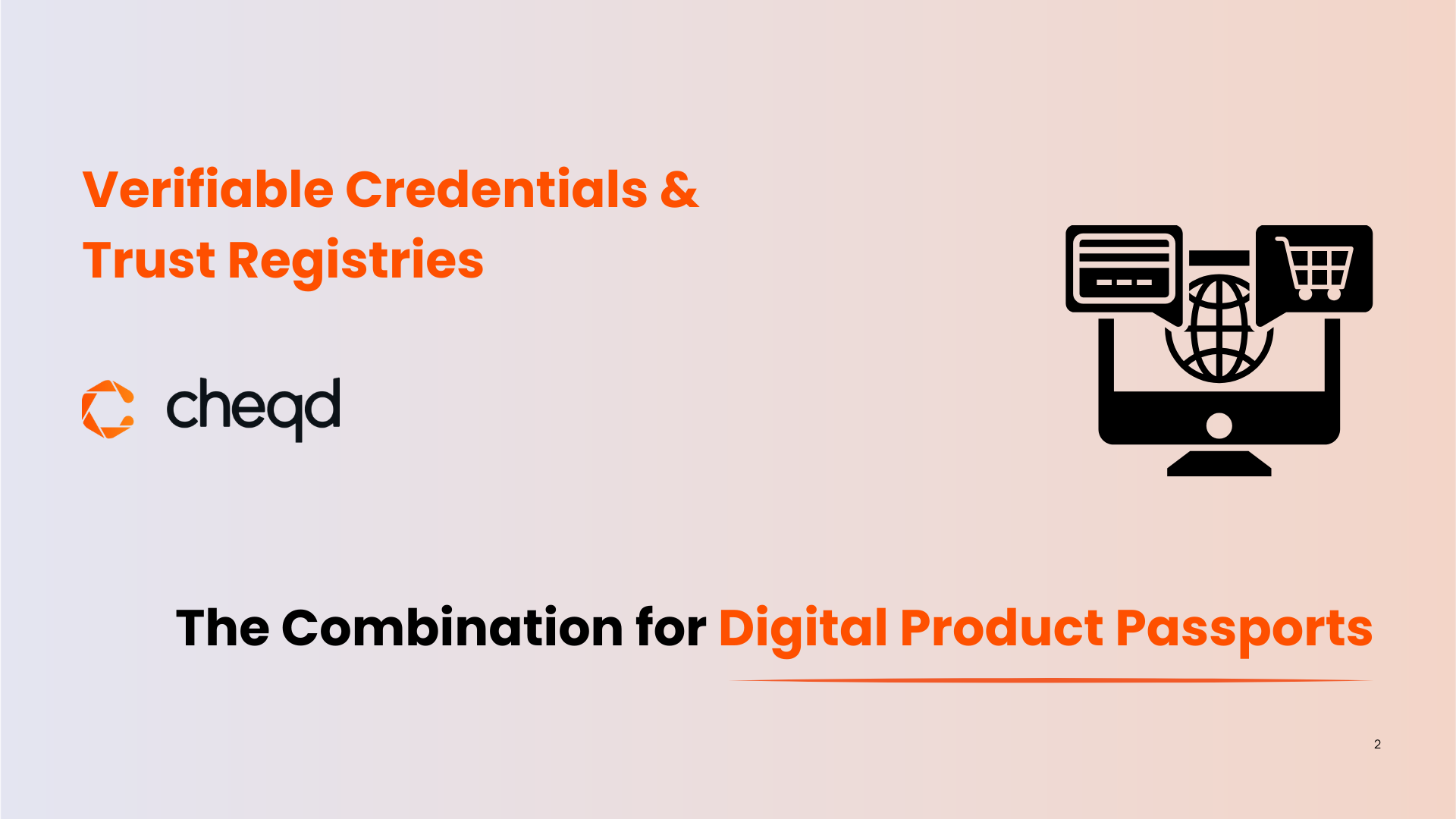Setting the vision for the year ahead for delivering on cheqd network’s unique differentiators in decentralised identity
Co-authored by Ankur Banerjee (CTO/co-founder), Ross Power (Product Manager), and Alex Tweeddale (Product Manager & Governance).
The cheqd team is thrilled to begin 2023 with our first major version released for the cheqd mainnet/testnet to v1.x, which was successfully carried out on 30th January 2023. Throughout this blog post, we want to revisit our product reflections at the end of last year, and lay out a vision for the future.
🚀 Our product roadmap at cheqd for 2023
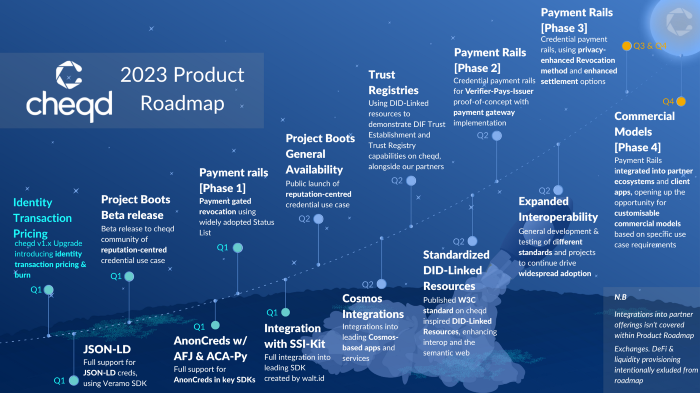
product roadmap at cheqd for 2023, at a glance
Therefore, for this year, we’ve outlined five product development goals the cheqd team is working on, in terms of objectives we want to achieve by the end of 2023:
- Double-down on building payment rails for digital identity: This is the unique selling point for which most of our partners signed up to the cheqd network — and why many people in the cheqd community are backing us. For reasons we’ll go into more detail in the blog post, we had to spend more time than we anticipated in 2022 laying down the groundwork for this — but now that those foundations have been delivered in our v1.x release, we’ll be laser-focussed on delivering the payment rails everyone has been waiting for.
- Continue simplifying developer experience to make building on top of cheqd network faster and cheaper: We’ve spent a lot of time in 2022 simplifying the developer experience for partners and app developers building products on cheqd. We plan to continue on our mission to make building products on cheqd simple in comparison to Web2 as well as Web3 digital identity competitors. We also want to drive more organic adoption of network usage by existing and future partners.
- Support compelling products addressing decentralised reputation for Web3 ecosystems: 2023 seems to be a turning point where the wider crypto ecosystem has acknowledged that Web3 requires compelling solutions to decentralised reputation, but so far this effort has been focussed on using NFTs for identity (hello, soul-bound tokens), proof-of-attendance protocols (“POAPs”), and so on. As we laid out in our trends report on decentralised identity, we think there’s a large and unaddressed gap in the market for a more privacy-focussed vision of how online reputation can be solved in decentralised communities. We’ve been working on skunkworks project for the past few months, codenamed “Project Boots”, which is aimed at this space.
- Integrate deeper with the Cosmoverse and beyond: We focussed a lot of last year on building out strong partnerships in the self-sovereign identity (SSI) ecosystem. This year, we want to leverage the multichain vision of the Cosmos SDK ecosystem to become one of the go-to solutions for digital identity within the Cosmoverse. We also believe that our network can be of utility for Web3 projects not built on Cosmos SDK, without them needing to switch blockchains. At the same time, we will work on improving the availability of $CHEQ tokens, and first-class support in crypto apps (such as wallets and explorers), all with the aim of making it easier to use and build upon the network.
- Drive adoption via industry standards for product innovations made at cheqd: We’ve been working on differentiated product innovations last year at cheqd, such as our approach to DID-Linked Resources. While we’ve written and designed this to be ledger-agnostic, widespread adoption of this idea (and therefore, normalising its usage on the cheqd network) requires us to do the legwork to get them codified as industry standards at W3C, DIF, and ToIP. We think the time is ripe for this, given the Decentralized Identifiers Core (“DID Core”) became an official W3C Recommendation standard last year.
We’ll deep-dive into each of the five product development goals below. Alongside this, we are very excited to share an interactive product roadmap for cheqd which we will continue to update and iterate over the course of the year and beyond.
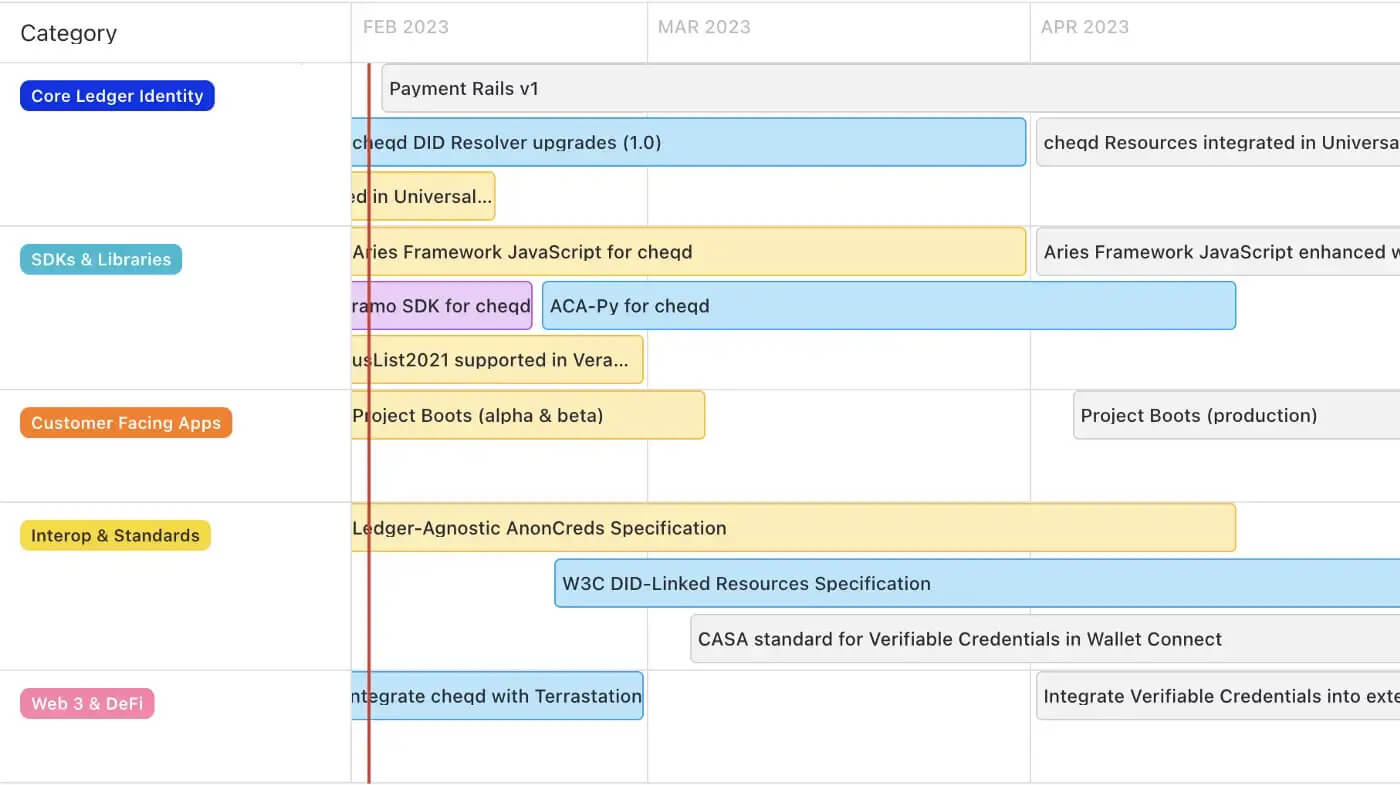
1️⃣ Double-down on building payment rails for digital identity
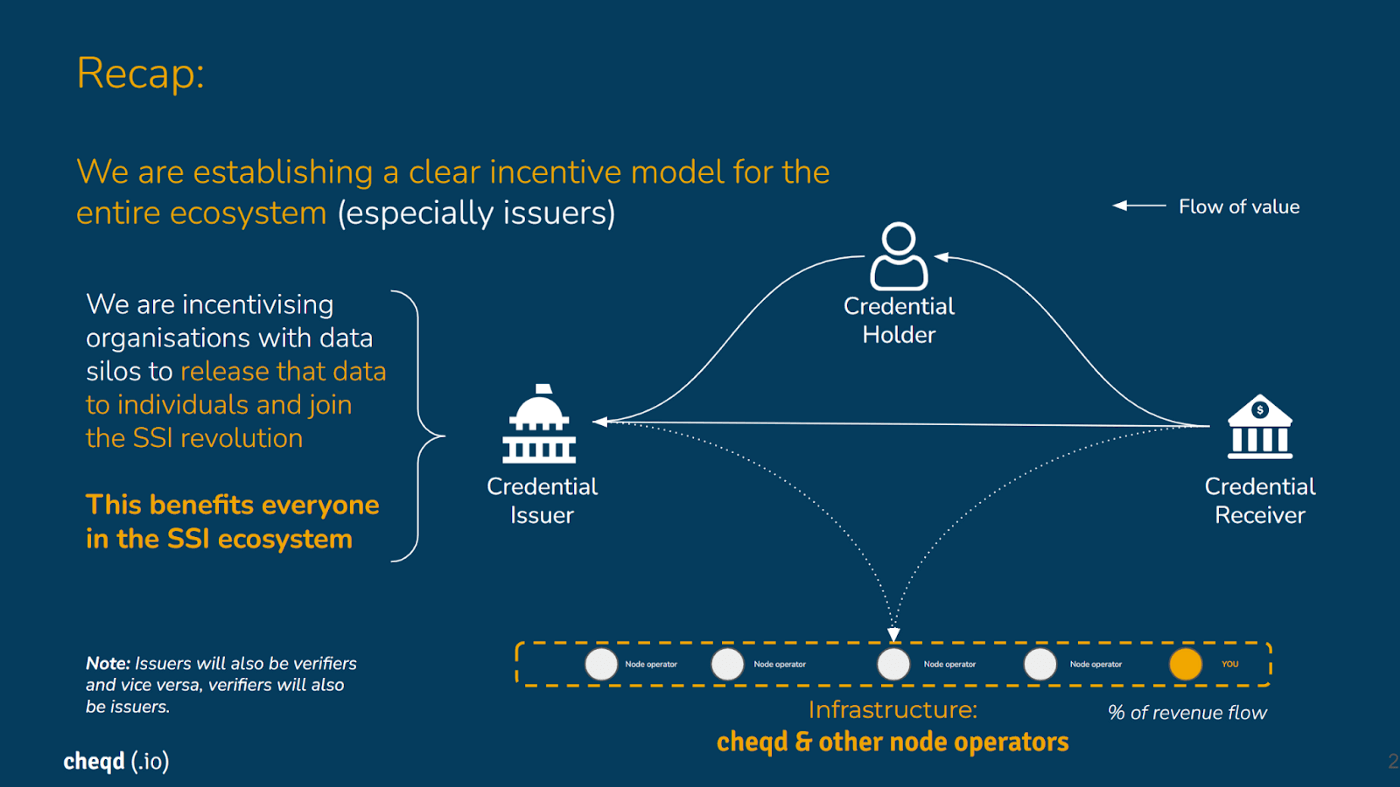
Payment rails for verifiable credentials will enable each party in a digital identity ecosystem to be rewarded for their participation in the network. Credential issuers may be rewarded for issuing Verifiable Credentials; Holders may be rewarded for sharing their own data in the form of Verifiable Credentials or Presentations; Credential recipients (“Verifiers”) may be rewarded with compliance benefits and lower costs for identity verifications.
At the same time, we acknowledge that one of the fundamental principles of SSI / decentralised identity is giving power to the user. We believe there’s a happy middle-ground that can enable these payment rails and have privacy-preserving characteristics that the SSI ecosystem (and users) value.
REAL-WORLD ANALOGY
- You might hold a drivers licence, issued by a trusted authority (e.g., the government driving licence authority)
- When you go to buy an age-restricted product, such as alcohol or tobacco, the store might check your age by asking you for your drivers licence. (Note that the “credential” is being used here outside its original intended purpose to prove the right to drive.) This interaction is “free” for the store’s clerk, since they are only interested in checking whether the age in an official-looking document is above a certain number,
- However, if you wanted to rent a car, the car rental agency might run a live check against a government database or other 3rd party API to determine whether the licence is currently valid, or whether it has been revoked ahead of its original expiry date. This interaction typically costs the car rental agency something, i.e., a per-check fee paid to the API they do the lookup on.
PUTTING THE ANALOGY IN THE CONTEXT OF SELF-SOVEREIGN IDENTITY
The holder is you (the driving licence holder), the issuer is the driving licence agency, and there are two (separate, unrelated) credential recipients (“verifiers”): the alcohol store and the car rental agency. We believe there’s a large sector of the SSI market where credential recipients will be willing to pay a small fee to check the status of credentials, and it will motivate potential credential issuers to hand out data in portable and secure data credentials.
HOW WE’RE APPROACHING BUILDING OUT PAYMENT RAILS THIS YEAR
- A decentralised credential status & trust registry: This answers the question “Is this credential I’ve been shown revoked or not?” and “Is the issuer of the credential trustworthy?”. We’ve already delivered a mechanism to answer these two questions in a decentralised fashion, using DID-Linked Resources (and made it more robust in our v1.x mainnet release).
- A token-based payment-gating mechanism: The status & trust registry above should only reveal the answer once the pre-defined payment set by the issuer of the credential has been paid. In other words, this would be a mechanism to charge for read actions on DID-Linked Resources.
- A payment-privacy system: The value of a transaction or the sender/recipient itself can leak private information about the parties involved. An ideal payment mechanism for the above would try to minimise information leakage.
2️⃣ Continue simplifying developer experience to make building on top of cheqd network faster and cheaper
When we started 2022, cheqd had just launched its mainnet in November 2021. While our first mainnet release certainly offered enhanced support for more complex Decentralized Identifier Documents (“DID Documents”), we knew that we were going up against incumbent networks in self-sovereign identity which had been building for much longer than us.
So we set out in address one north star question within the product team last year: “Can an app developer, starting from scratch, build a digital identity use case on cheqd in less than 30 minutes?” Critically, we didn’t distinguish this with any qualifiers such as “…compared to other SSI networks” or “…compared to Web 2.0 identity solutions”. Both Web2 as well as Web3 identity solutions are our competition since they represent the status quo in how our digital identities are handled online.
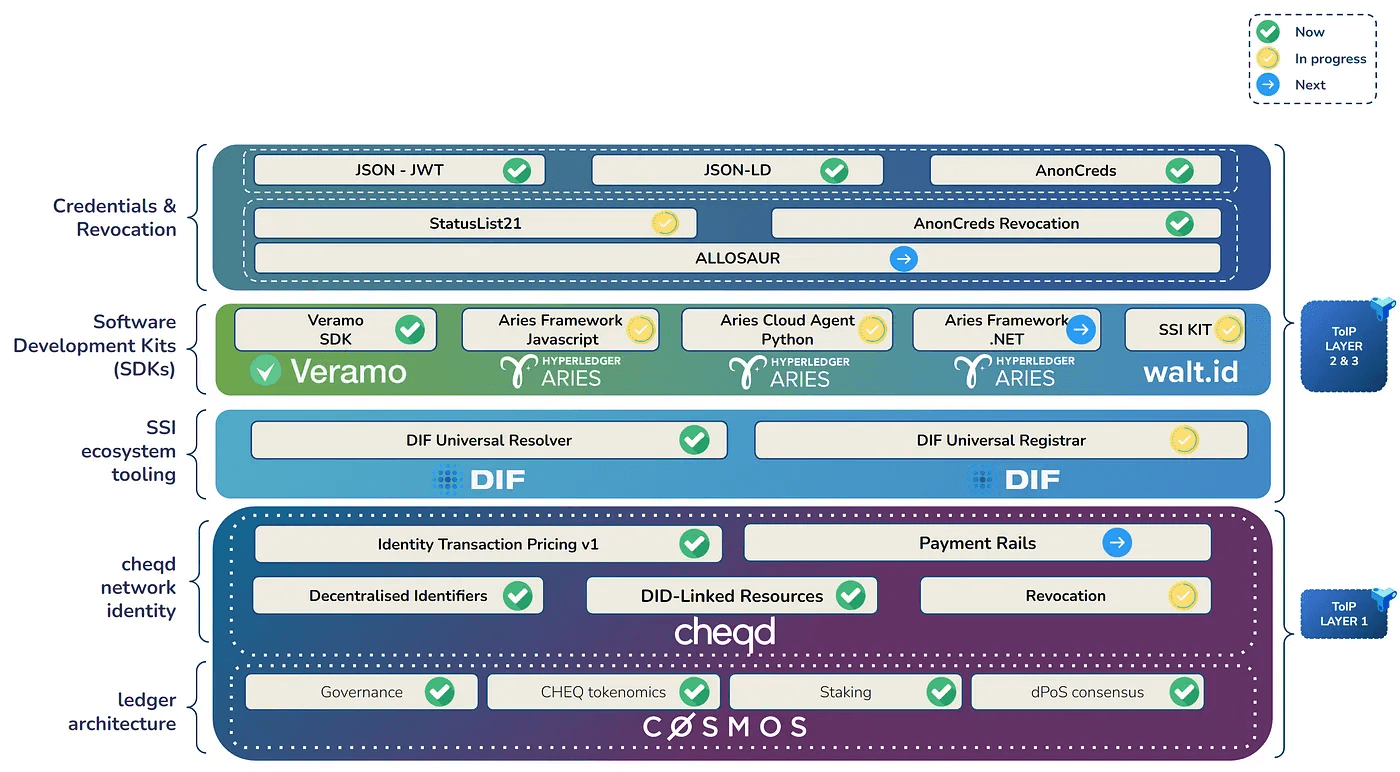
Much of what we’ve shipped in terms of products on-ledger and off-ledger was building towards answering this question. Some of this work was driven by the cheqd Product & Engineering team directly to jump-start network usage, such as building a plugin for the widely-used Veramo SDK for W3C-compliant DIDs and Verifiable Credentials.
Other efforts, such as the work done on Hyperledger Aries by Animo to make AnonCreds independent of Hyperledger Indy happened more organically through app developers building on top of the cheqd network. Ultimately, we want more app developers organically building products, so that our team can focus on unique differentiators that no other decentralised identity network offers.
STRENGTHENING PRODUCT PARTNERSHIPS ON REAL-WORLD USE CASES
Product partnerships are crucial to cheqd as a network, whether they are mature SSI vendors, or startups that have heard of SSI but haven’t dipped too far into building it into their products so far.
Instead of just looking at integrating cheqd at a technical level, we’re collaborating on more than a dozen specific product use cases with our partners, such as:
- Single Sign-On (opening up the opportunity for “Sign-in with cheqd”);
- Integrations in enterprise uses cases in Web2;
- Integrations into Web3 use cases including community & reputation managements;
- Integrations in private network consorta clients
- Integrations for Consumer Credit scores to Web3 lending environments
- Integrations for recycling and sustainability payments
- Payment rails for financial institutions
- Opportunities for better management of storage
MAKE IT EASIER TO WRITE TO THE CHEQD NETWORK FOR A WIDER RANGE OF APP DEVELOPERS
At the start of 2022 we surveyed our partners to inform our product strategy for the year. The responses emphasised the importance and potential impact of assigning part of our time to adding cheqd network support in Hyperledger Aries, which is the most widely-used SSI SDK kit.
(N.B, Respondents could select that they are using multiple SDKs hence the reason for graph illustrating a percentage greater than 100).
Therefore, this year we’re continuing to build on the progress we made to support Aries frameworks on cheqd, working closely with our partners and the wider SSI community to advance standards and interoperability. This includes contributing to and integrating with Hyperledger AnonCreds, a ledger-agnostic and client-agnostic version of the widely used AnonCreds credential format. Working with Animo, we’re enabling our partners to issue Hyperledger AnonCreds using the Aries Framework Javascript SDK, followed by ACA-Py.
However, we also know that not every SSI vendor uses Aries SDK. Having a diverse and vibrant ecosystem of SDKs is important for creating a truly decentralised developer ecosystem, and as such we’re continuing to work closely with the Veramo SDK, supporting both JSON-JWT and JSON-LD credentials.
We also believe that outside of the SSI vendors we’re already partnering with, there’s a larger market of app developers who want to build privacy-enhanced digital identity experiences, but aren’t currently using SSI in their products. This has been evidenced by a large volume of inbound requests we’ve had from such startups and app developers, asking us how they could incorporate a new model for digital identity into their products. Asking these app developers to wholesale switch SDKs is hard.
Therefore, we’re focussed on building cheqd network support into DIF Universal Registrar, making it quick and easy for app developers to integrate cheqd using simple REST APIs. (REST APIs are the most commonly-used API pattern, used in Web 2.0 apps as well as within Cosmos SDK itself, e.g., for Keplr Wallet interacting with Cosmos dApps.) This will increase cheqd’s wider adoption and user / developer experience for SSI vendors, developers and Web3 partners.
PRODUCTION-GRADE SUPPORT IN SSI SDKS AND TOOLS
With a huge amount of work on ledger-agnostic AnonCreds in-flight, we plan to continue funding and accelerating efforts to unlock first-class support for cheqd network in the most widely adopted SSI SDK.
We’re also excited to announce that we will soon be fully supported in walt.id’s SSI Kit, which natively supports JSON and JSON-LD credential types, while using a different credential exchange protocol to our existing Veramo SDK plugin. Walt.id’s SSI Kit uses the Open ID Connect Stack for credential and presentation exchange, affording cheqd even more coverage across the Verifiable Credentials landscape.
3️⃣ Launch compelling products addressing decentralised reputation for Web3 ecosystems
A large gap in the current SSI space is functional governance for SSI ecosystems. There are a few approaches to Trust Registries and Trust Establishment which are currently unstandardised and generally rely on centralised infrastructure. We presented a research paper at the Rebooting Web of Trust conference last year, titled Dynamic & Decentralized Reputation for the Web of Trust: What We Can Learn from the World of Sports, Tinder, and Netflix which laid out some of extremely long-term thinking on where the digital ID industry is heading.
In the more immediate term, with cheqd’s DID-Linked Resources we’ve built a perfect foundation for creating Trusted Issuer Lists, Trust Establishment files, Credential Manifests or Presentation Definitions on-ledger, identifiable with a fully resolvable DID URL. This may even improve the standard paradigm for working with interoperability profiles such as WACI-DIDComm.
Further to this, one of the needs we’ve identified from SSI clients is a web application that is able to manage trusted issuers in a given ecosystem, as well as what levels of governance are required for different purposes.
Using cheqd DID-Linked Resources, we foresee this being far easier to achieve than by building from scratch. This year, we plan to demonstrate these benefits and streamline their existing client facing application and demonstrate DIF Trust Establishment and Trust Registry capabilities on cheqd, alongside one of our partners.
Lastly on this point, we plan on launching our skunkworks project, codenamed “Project Boots”, within Q1/Q2 of this year. While the SSI space often uses the usual suspect use cases, e.g., Know Your Customer (KYC), education degrees, etc, in examples quite often, we fundamentally think these are infrequent use cases, and therefore not something truly painful that real-world users face on a daily basis. What they struggle with is proving their reputation online. Stay tuned for more on how we plan to re-use everything we’ve already launched in a compelling and fun experience for tackling reputation in Web3.
4️⃣ Integrate deeper with the Cosmoverse and beyond
One of the things we understand, in hindsight, is that while we focussed last year a lot on SSI vendor partnerships, we didn’t focus perhaps as much on building equally deep ties within the Cosmoverse. While some of the most notable players in the Cosmos ecosystem validate on our network and we collaborate in terms of contributing back open source code, we could do even better at this.
It’s worth noting that as part of our v1.x release, cheqd is one of the first Cosmos SDK chains to adopt Cosmos SDK v0.46, which brings capabilities such as Interchain Accounts. Besides, Cosmos SDK v0.46 introduces long-term and stable fixes for the “Dragonberry” security vulnerability which could theoretically compromise IBC payments. Incorporating the deep nuts-and-bolts changes needed to make cheqd ledger compatible with changes in upstream Cosmos SDK was one of the reasons why our v1.x release took longer than we expected. While being one of the first chains to adopt this Cosmos SDK release was technically challenging, we take security very seriously at cheqd — especially as we want to build the payment rails for digital identity.
Moreover, the next version of Cosmos SDK (v0.47) has an even bigger growth spurt to make the interchain software foundations more robust and secure. While we won’t need to incorporate these right away, the work we’ve done to transition v1.x will make the process of moving to Cosmos SDK v0.47 smoother when the time comes.
We’ve heard you loud and clear, though, on the need to increase our presence in the Cosmoverse. Some of our aspirational goals in this space are:
- First-class support for cheqd network in more Cosmos SDK wallets and apps: We’ve got first-party integrations into Leap Wallet for our network’s token functionality. We want to work on expanding support for Verifiable Credentials natively in crypto wallets by extending the WalletConnect protocol in 2023. Ideally, we want to extend this to Keplr Wallet and Mintscan, which are the two biggest product requests we get. We’re in continued discussions with both and are looking forward to these product integrations as soon as reasonably possible.
- Position cheqd as one of the go-to solutions for digital identity within the Cosmoverse: We’ll leverage the good work we’ve done last year, and continue to do this year, in terms of making utility usage of our network easier to specifically guide Cosmos SDK projects on how to use cheqd for privacy-enhanced digital ID. Our goals defined under simplify developer experience and decentralised reputation (aka “Project Boots”) both feed into this goal.
As always, we’ll continue to support $CHEQ in more CEXs/DEXs as an ongoing goal to make the tokenomics of our network more viable.
5️⃣ Drive adoption via industry standards for product innovations made at cheqd
Technical standards are crucial in ensuring interoperability between different SSI ecosystems. As such, we are currently in the process of getting two different standards created: ledger-agnostic Hyperledger AnonCreds and W3C DID-Linked Resources. This is based on feedback from our SSI vendor-partners that efforts we put into getting these product innovations at cheqd incorporated into standards has a tangible impact on their prioritisation for these features into being used in their products.
Later in the year, we will kick off a technical standard looking at how Verifiable Credentials can be incorporated within WalletConnect at the Chain Agnostic Standards Alliance (CASA). The basic idea here is that there are far more crypto wallets in active use, as opposed to SSI wallets, and native support for Verifiable Credentials in crypto wallets will significantly increase the reach and distribution of SSI. We want to focus on WalletConnect since some of the most widely-adopted crypto wallets support this protocol, and our proposal would be to specify a technical method through which dApps and wallets can signal which kind of Verifiable Credential features they support. Similarly, we’re also exploring collaboration with the Open Wallet foundation, a Linux foundation project with the goal of developing an open-source engine for secure and interoperable multi-purpose wallets.
Finally, we are eager to participate and explore live interoperability testing amongst projects, such as Silicon Valley Innovation Program Plugfest and other large SSI networks such as European Blockchain Services Infrastructure (EBSI) and LACChain. This is important because cheqd does not want to build in a vacuum and aligning with other chains, programmes and identity initiatives will ensure that cheqd’s progress in payments and resources is market-ready and interoperable cross-ecosystem.
⏪ How our v1.x release enables our 2023 product goals
Hopefully, we’ve given a flavour above on our product vision for this year. We’ve been humbled by the response over 2022 from our partners and app developers building on top of the cheqd network. There is clear excitement about the product vision we’ve laid out in terms of economically-sustainable business models for digital identity. But to truly be able to build towards that vision, our strategy was to first offer a decentralised network that was incrementally better than the current state-of-the-art in self-sovereign identity.
Making AnonCreds ledger-independent and the opportunities unlocked by DID-Linked Resources are two tangible examples where we exceeded the capabilities of current SSI networks. But, we also knew that achieving our north star goal of “up-and-running in 30 minutes or less” required additional effort.
To wrap up our product vision, we wanted to recap the key areas that our v1.x release delivers on, and forms the fundamentals of our product roadmap we’ve outlined above for 2023…
ENHANCE DID AND DID-LINKED RESOURCES FUNCTIONALITY
The feedback on DID-Linked Resources that we received from the decentralised identity community has been, overall, positive. One of the features that developers appreciated was the robust versioning (and being able to query historical versions) for these digital Resources. While it was technically possible to query historical versions of DID Documents as well, we’ve released the same robust versioning method we built for DID-Linked Resources for actual DID Documents themselves. (It’s worth noting that not all DID methods support versioning.)
We also spent the latter half of 2022 building SDKs and integration software such as support in the DIF Universal Resolver, which we know are important for developer adoption. Using the lessons learnt along the way, we refactored parts of our on-ledger code to make building integrations with SDKs and 3rd party apps easier. This enables our goals for simplifying developer experience, integrating deeper with Cosmoverse, and aligning for industry-standardisation (based on feedback we received for DID-Linked Resources).
MAKING IDENTITY TRANSACTION PRICING MORE ECONOMICALLY-SUSTAINABLE
Prior to the v1.x update, writing a DID to cheqd mainnet only costs gas, approximately 0.004 $CHEQ. In comparison to other networks, this is a far lower price (you’ll find a pricing comparison here, also below).
MAKING IDENTITY TRANSACTION PRICING MORE ECONOMICALLY-SUSTAINABLE
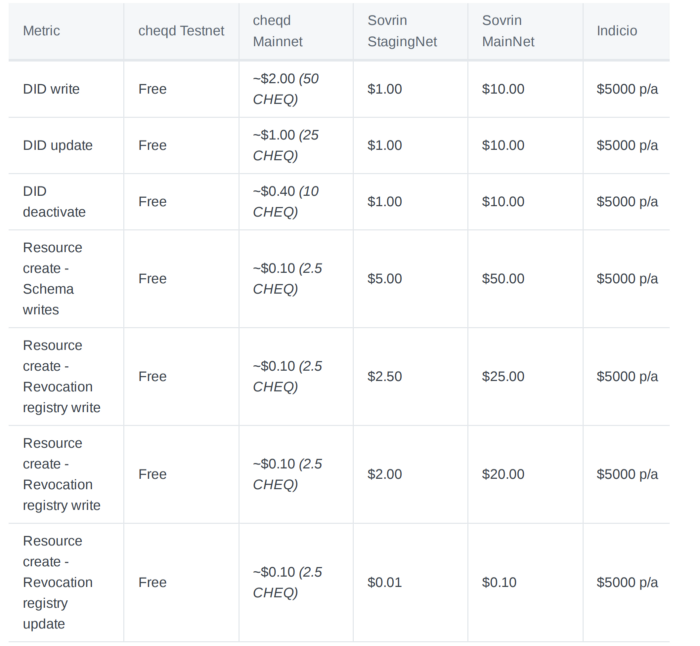
Additionally, $CHEQ was previously inflationary, meaning the staking rewards are generated from inflation only, and only slashing, tombstoning or no-with-veto slashing provide an inflationary pressure. Therefore, we chose to introduce two key mechanisms to counteract these. The first, identity transaction pricing, means that any transaction on-ledger related to identity has a specific, fixed fee. For example, creating a DID or any form of resource, like an image or schema, has a set fee. The current prices for these can be seen here, and below.
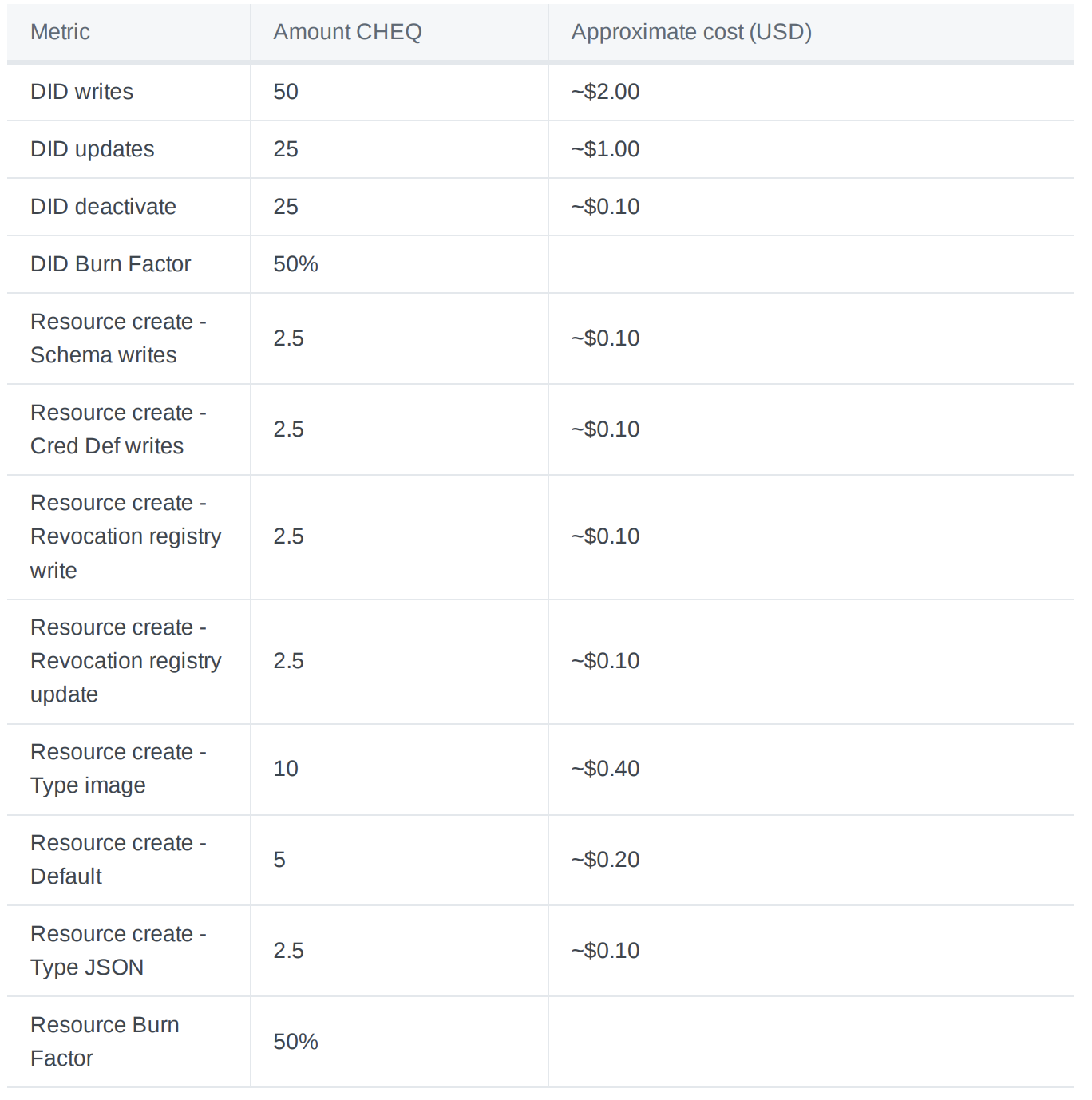
The second, a burn mechanism helps establish equilibrium with the inflation on the network by burning a proportion of the identity transaction charges above. Over time we see this a viable route to return the total supply to the total initial supply of one billion $CHEQ. The current burn % has been set at 50%, however we have tested the right up to 99% and will take the communities lead to decide where this % will remain for a longer term.
In addition to making identity transactions more economically-sustainable, we also see this an important method of providing more stability to app developers building with cheqd, as a means to more accurately forecast and price the build of products for customers.
COMPLEXITIES AND CHALLENGES WITH THE V1.X RELEASE
Preparing for and implementing the v1.x release did however have its fair share of challenges, which transparently slowed down our release cycle.
To accommodate for the ledger enhancements, fundamental changes were required to the underlying code base which the ledger uses. For example identity transaction pricing and the ability to provide an alternative URI for a DID did not exist in the previous version, meaning this feature would not be possible to implement. The effort and time required to implement the changes and test these expanded far greater than we’d anticipated, however ultimately doing so has put us in a far better position which will mean we take back the time in future implementation and releases.
We’ll be providing a deeper-dive into these challenges, plus others, and crucially our lessons learnt which we hope will be useful for other Cosmos SDK-based projects and the general developer community alike.
Tell us what you think!
It’s going to be a very busy and ambitious year here at cheqd and we would love your feedback on our product vision for 2023. We welcome engagement and feedback across a range of different forums, such as our Community and Commonwealth Governance Forum (best for extended, in-depth discussions).
We, at cheqd, help companies leverage SSI. cheqd’s network is built on a blockchain with a dedicated token for payment, which enables new business models for verifiers, holders and issuers. In these business models, verifiable credentials are exchanged in a trusted, reusable, safer, and cheaper way — alongside a customisable fee. Find out more about cheqd’s solutions for self-sovereign identity



